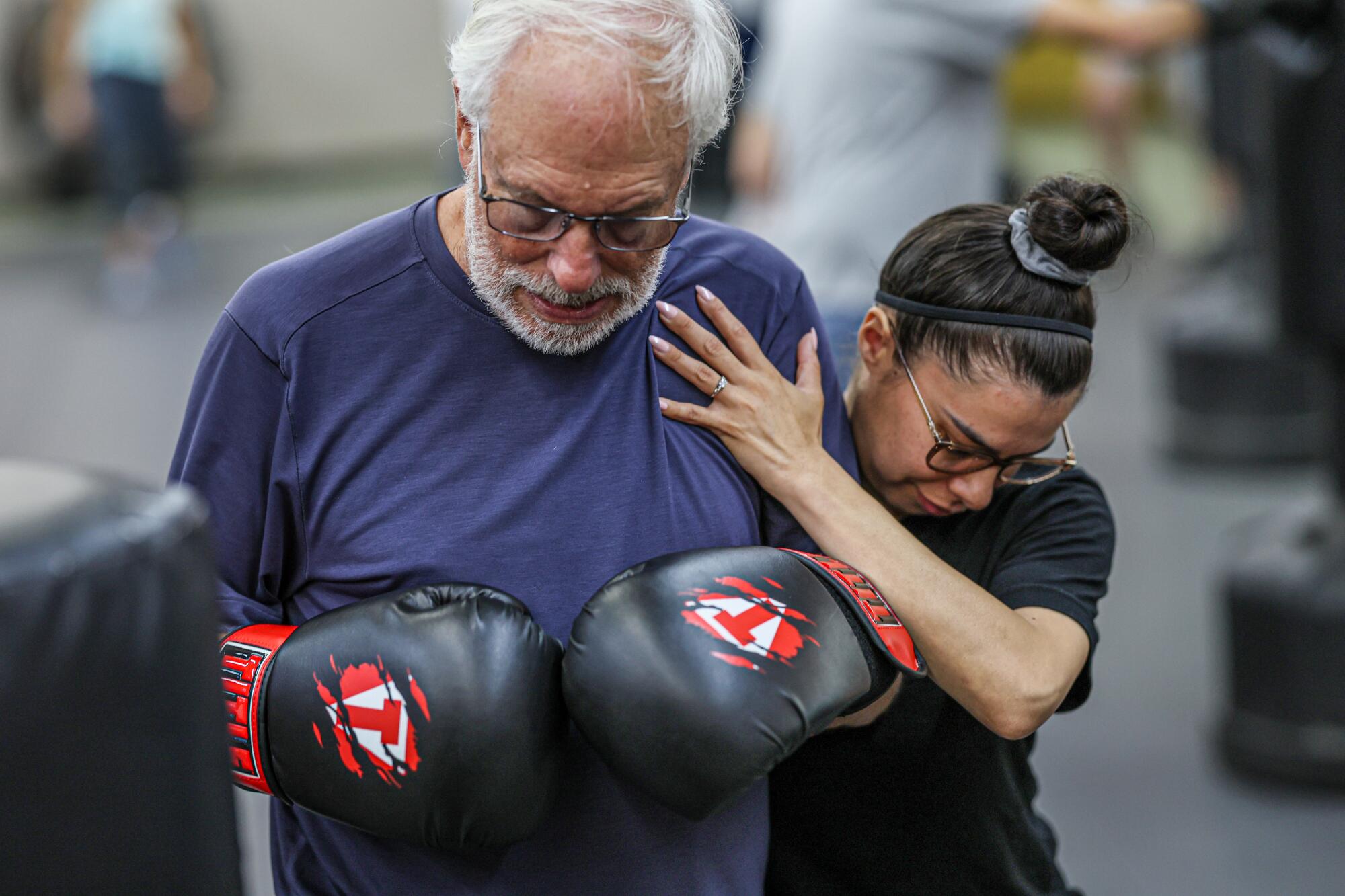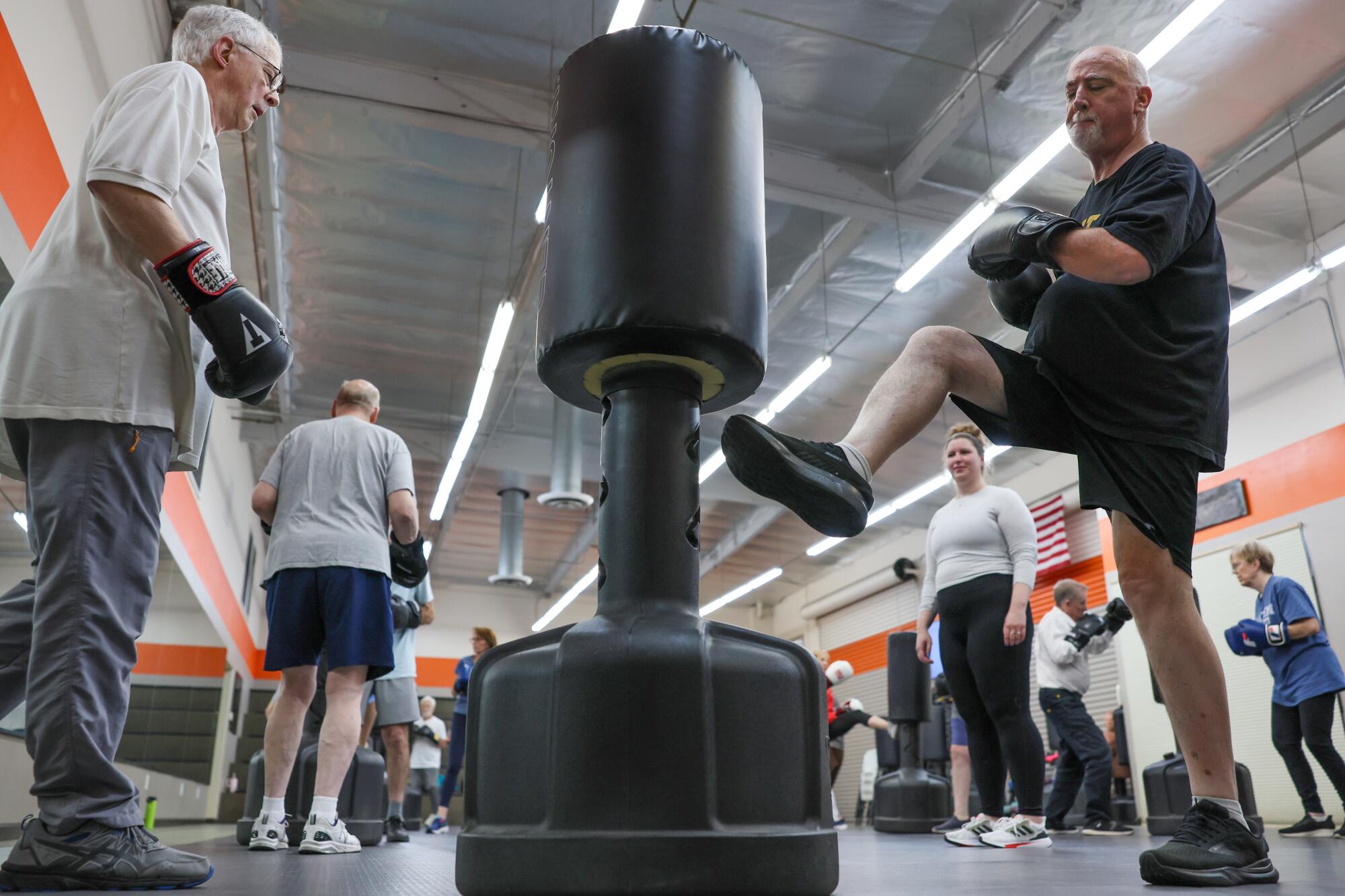
- Share via
They pull giant boxing gloves over aging, sometimes shaking hands.
They approach a black punching bag on weary, sometimes wobbly feet.
Then they wail.
Lord, do they wail.
They hit the bag with a left-handed jab, a right-handed reverse, a hook, another hook, an uppercut, another jab, bam, bam, bam.
They end the flurry with kicks, side kicks, thrust kicks, wild kicks, their legs suddenly strong and purposeful and fueled by a strength that once seemed impossible.
L.A. Times sports columnist Bill Plaschke feels equally grateful and guilty that his home in Altadena was spared as wildfire ravaged his neighborhood.
Outside of this small gym in a nondescript office park in Monrovia, they are elderly people dealing with the motion-melting nightmare that is Parkinson’s disease.
But inside the walls of Kaizen Martial Arts & Fitness, in a program known as Kaizen Kinetics, they are heavyweight champs.
Ranging in age from 50 to 90, spanning the spectrum of swift strides to wheelchairs, they are the most courageous athletes I’ve met.
They show up here every couple of days hoping that they’ll move enough to keep the evil Parky at bay. They’re trying to punch him out, kick him off, scare him away, and they’ll endure more than an hour of sometimes painful exercise to make this happen.
They are frail women screaming, “Jab!” and shaky men screaming, “Hook!” and everyone counting with clenched teeth through 75 minutes that stretch the shrinking muscles and test the weary optimism.

I am in awe of them, perhaps because I am one of them.
I, too, am living with Parkinson’s disease.
The irony, huh? I’ve spent my entire career writing triumphant stories about athletes overcoming illness and adversity, only to reach the home stretch struggling to find a similar triumph in a story about me.
It’s not easy. Now I know what all those subjects of all those feel-good stories understood about the truth behind my positive prose. Degenerative disease sucks beyond any inspirational adjective. Incurable illness stinks beyond any hopeful headline.
I’ve got Parkinson’s, and it hurts to even say it. I’m still mobile, still active, I don’t have the trademark tremors that distinguish the famously afflicted Michael J. Fox or the late Muhammad Ali but, damn it, I’ve got it.
I was diagnosed four years ago after complaining of weakness in my right arm. That weakness has disappeared, but it’s a constant struggle to keep everything else from slowly going to hell.
Every day it feels like I’ve just run a marathon. I move well, my balance is fine, but I’m always tight, always creaking. The amount of medication required to keep me active is so immense, my pills come in gallon jugs and I spend entire Dodger games trying to discreetly swallow them in the press box.
I move slower now. My fiancee Roxana qualifies for sainthood because whenever we go out, she must patiently wait for me to get dressed, which takes forever and is accompanied by the unholy sounds of struggle.
I don’t smile as much now. It’s harder to smile when afflicted with the trademark Parkinson’s masked face. When I FaceTime with my darling Daisy, I worry she won’t see past my dour expression and never know how much her granddaddy loves her.
Columnist Bill Plaschke didn’t score the most victories during his run on ESPN’s “Around the Horn,” but he did win a second family and ardent fans.
Until now, my condition has only been known to my family. Not even my bosses knew. I didn’t look like Parky, I didn’t act like Parky, so why should I publicly reveal something so personal and embarrassing?
Yeah, I was embarrassed. I felt humiliated in a way that made no sense and total sense. To me, Parkinson’s implies frailty, Parkinson’s implies weakness.
But let me tell you, a 72-year-old woman pounding the living hell out of a punching bag ain’t weak.
And that’s why I’m writing about this today.
If my boxing classmates can have the strength to sweat through their tremors and wallop through their fears, then I can certainly have the strength to celebrate them without worrying what sort of light it casts on me.
I’m proud to be one of them, and the purpose of this column is to reflect that pride and perhaps make it easier for other folks afflicted with Parkinson’s to come out swinging.

Officially, Parkinson’s is a neurodegenerative disease impacting both motor and non-motor systems. Translated, the brain slowly stops producing dopamine, which is crucial for movement, and the loss of this neuro-transmitter affects everything from your stride to your speech.
Roughly one million people in the United States have it, and there’s no cure for it, and it generally gets worse as one gets older. As Michael J. Fox himself once said, it’s the gift that keeps on taking.
You don’t die from it, but it can be hard to live with it, yet there is one thing that unquestionably helps slow its progression.
Exercise. Movement. Pull your achy body off the couch every day and work those quivering muscles, stretch those tight joints, perhaps join one of the many Parkinson’s programs in town that involve everything from dancing to hiking.
“For people living with Parkinson’s disease, regular exercise can reduce symptoms, help treatments work better and potentially even slow the disease progression,” Rachel Dolhun, principal medical advisor at the Michael J. Fox Foundation, wrote in an e-mail. “For some, exercise can look like participating in boxing classes. For others, it’s water aerobics, dancing or playing pickleball. Just remember that any type of and amount of exercise can positively support your journey.”
If you’re like me and you just want to punch Parky in the face, boxing works best. The 83 tough souls who t pay $179 a month to battle in the Kaizen Kinetics program agree.
L.A. Times sports columnist Bill Plaschke feels equally grateful and guilty that his home in Altadena was spared as wildfire ravaged his neighborhood.
“I hit the bag really hard like I’m hitting Parkinson’s,” said Rich Pumilia, 66, a lawyer from Monrovia. “Hitting it back for what it’s doing to me.”
I became aware of Jody Hould’s program, which she leads with the help of husband Tom, son Zac and Anthony Rutherford, shortly after I was diagnosed. I kept seeing their pamphlets in doctors offices and rehab centers. At the time, they were part of the popular Parkinson’s-battling Rock Steady Boxing program that has several locations through southern California. By the time I worked up the courage to fully face my illness and call the number on the pamphlet two years ago, Kaizen had become an independent program with a similar focus on boxing.
”Boxing is balancing, posture, turning, pivoting, extension, range of motion, using your core, everything that’s important to fighting the disease,” said Hould, who started the program nine years ago in memory of her late mother, Julie, who died of complications from Parkinson’s. “Plus, it’s fun to punch something.”
Hould and her team run a fast-moving program, barking out a series of punches and kicks while offering gentle reminders to those who hook when they should jab.
“Parkinson’s doesn’t take any vacations, it doesn’t take any days off, we have to be on top of our game, we have to be proactive in our fight,” Hould said. “Not only is it good for the spirit, it’s good for the mind.”
But it can be tough on the ego, as I quickly learned when a frail white-haired woman out-punched me one day while screaming at the bag. Another time an aging man with tremors and shuffled steps pounded the bag so hard it skidded into my feet.
I once showed up with a cut on my left hand and informed Hould that I would not be boxing that day.
“You still have your right hand, don’t you?” she said. “So you box one-handed.”

The 75-minute sessions are hard. Every exercise and maneuver are seemingly designed to do something I now have difficulty doing. Sometimes it hurts. Sometimes you want to be anywhere else.
But it works. It can’t kill Parky, but it can quiet him. Hould never promises a cure, but she sees some relief in those who join the battle. There was one boxer who eventually abandoned her walker. Others have seen a reduction in their tremors. Throughout the windowless gym there is real hope that this disease can be slowed.
Pumilia is convinced his condition has improved after attending classes for eight weeks.
“When I was diagnosed, my doctor said you have five good years left before your life is going to be impacted,” said Pumilia. “Now my doctor is basically saying, ‘I don’t know what you’re doing, but keep doing it.’”
Sharon Michaud, 65, a retired insurance executive who has also come to class for eight years, agrees.
“Without a doubt, it’s helped me,” said Michaud, who is noticeable in the class because she moves like a gymnast. “With Parkinson’s it’s easy to get into a funk and get depressed. You come here and it’s nice to know there are other people like you. I’m amazed more people don’t know there’s places like this out here.”
Maybe this story will shed some light on that. Maybe this story will inform a closeted Parkinson’s patient about programs like Kaizen Kinetics and empower them to pick up the phone and join.
If you decide to come to Monrovia, I’ll be the breathless guy in the back still unable to deliver a knockout punch but continually inspired by fellow fighters to keep trading blows with my hardest of truths.
I leave that gym sweaty and sore but uplifted with the reminder that I am blessed to still lead a wonderful active life filled with family and friends and work and travel and so, so much hope.
I have Parkinson’s. But, by God, it doesn’t have me.
More to Read
Go beyond the scoreboard
Get the latest on L.A.'s teams in the daily Sports Report newsletter.
You may occasionally receive promotional content from the Los Angeles Times.













